Emma's new film: Space Adventures
Emma, age 6, is back behind the camera for a new claymation short.
[youtube]5zEdaaXfYzE[/youtube]
Download the high quality version (15.4 MB, requires Quicktime)
Are you rich?
 Are you rich? Maybe it depends on how we define the word. Both presidential candidates were asked to define rich. Barack Obama said, "If you are making more than $250,000, then you're in the top three or 4% of this country. You are doing well." John McCain refused to give a direct answer to the question, but jokingly suggested the number $5 million. By either of these definitions, I'm not rich, and I'm guessing you aren't either. If you are, congratulations. You've worked hard and achieved the American dream (or you inherited money from your rich family.) I can understand that a rich person would want to vote according to their financial interests. If you are rich and you want to be richer, then John McCain may be the candidate for you. But for the rest of us, I believe the Barack Obama is the best candidate.
Are you rich? Maybe it depends on how we define the word. Both presidential candidates were asked to define rich. Barack Obama said, "If you are making more than $250,000, then you're in the top three or 4% of this country. You are doing well." John McCain refused to give a direct answer to the question, but jokingly suggested the number $5 million. By either of these definitions, I'm not rich, and I'm guessing you aren't either. If you are, congratulations. You've worked hard and achieved the American dream (or you inherited money from your rich family.) I can understand that a rich person would want to vote according to their financial interests. If you are rich and you want to be richer, then John McCain may be the candidate for you. But for the rest of us, I believe the Barack Obama is the best candidate.
When I watched the speeches of both political conventions, it was clear to me that the Republicans were trying to appeal to the richest Americans, the top 2-3%, and the Democrats were trying to appeal to the other 97%. You can see the difference in the stories they tell about American people:
A story from Obama speech
We're a better country than one where a man in Indiana has to pack up the equipment that he's worked on for 20 years and watch as it's shipped off to China, and then chokes up as he explains how he felt like a failure when he went home to tell his family the news.
A story from McCain's speech
I fight for Bill and Sue Nebe from Farmington Hills, Michigan, who lost their real estate investments in the bad housing market.
For some Americans bad times mean losing real estate investments. For other Americans bad times mean getting laid off and being unable to feed your family. Which of those stories do you relate to?
You can also see the difference in the candidates' tax policies:
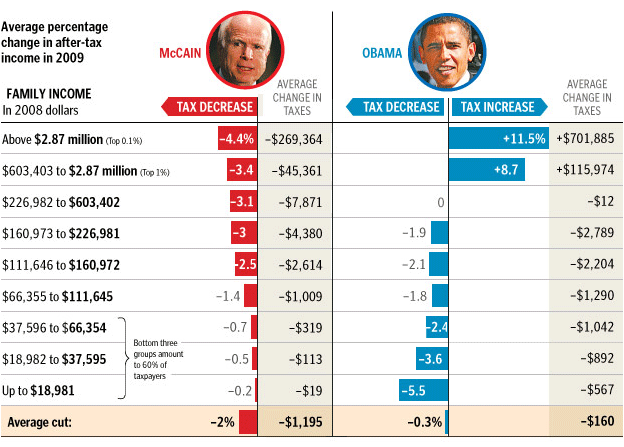
If you're rich, John McCain will work to make you richer. If you are not rich, Obama is the candidate that will improve your financial situation.
You can see the same pattern in the health care proposals of the candidates. Obama's plan attempts to secure health care coverage for the 47 million Americans who currently have none. McCain's plan makes no attempt to cover everyone. Rich people can afford good health care. For the rest of us, it can be a struggle.
McCain's campaign is run by a cadre of rich Washington lobbyists. Obama's campaign has been funded by a record-breaking number of small donors. McCain cheated on and then left his first wife and married a young, rich beer empire heiress. He now owns more homes than he can keep track of. In spite of his father's high rank in the Navy, McCain graduated from a military academy near the bottom of his class. Obama came from a middle-class family and worked hard to earn scholarships to good schools. He could've taken a high-paying job as a Wall Street lawyer, but he went to Chicago to help those less fortunate and to teach constitutional law. If you are rich, you can probably relate to McCain's story. If you're not, then Obama's may seem more inspiring to you.
McCain wants to continue the war in Iraq, which has benefited the rich owners of private contractors like Halliburton and Blackwater. Obama wants to bring our (mostly non-rich) combat forces home.
In the struggle between organized labor and company owners, McCain serves the interests of the rich yet again. Obama has received several endorsements from unions. If you are an executive or company owner, then McCain is looking out for you. If you or someone in your family has health care and good wages because of a union, then Obama is your candidate.
 When it comes to energy, McCain wants to give more of our land over to oil companies even though it will have little to no effect on the price you pay at the pump. McCain didn't always support offshore drilling, but once he began supporting the oil companies with this position, they began supporting him with increased donations to his campaign. Obama is willing to upset the rich oil companies by reducing their tax loopholes and putting that money to work creating new jobs and moving toward the long-term goal of homegrown and sustainable energy sources.
When it comes to energy, McCain wants to give more of our land over to oil companies even though it will have little to no effect on the price you pay at the pump. McCain didn't always support offshore drilling, but once he began supporting the oil companies with this position, they began supporting him with increased donations to his campaign. Obama is willing to upset the rich oil companies by reducing their tax loopholes and putting that money to work creating new jobs and moving toward the long-term goal of homegrown and sustainable energy sources.
So, if McCain's policies do the most good for the top 3% of the population, then why does the race seems so close? I think there are a few reasons. First, the rich can give more money to the campaign and to third-party attack groups. Second, many voters who are not rich are convinced that they will be rich soon. Call it optimism or naivete, but they are willing to vote against their own interests now in order to benefit themselves in some imagined future.
There's another important reason that McCain and other Republicans can get 50% of the vote while serving the needs of 3% of the population. It's called the Culture War. There are many questions for which there is no clear answer that we can all agree on. Various religious organizations come to different conclusions and for most of these questions, our holy books and our Constitution provide no specific answer. Here is a sample of some of these questions.
Do homosexuals deserve the same rights and privileges as heterosexuals?
Can we enforce some restrictions on gun ownership or does the Second Amendment guarantee unrestricted gun rights?
Is the death penalty an ethical punishment?
How do we balance the short-term needs of humans with the long-term safety of our environment?
Does a fertilized embryo deserve the full complement of human rights?
Should women have access to birth control?
Should underage women have access to birth control?
Should we teach sex education for the safety of our children or does it only encourage teens to become sexually active?
What is the line between free speech and pornography?
How do we balance our needs for privacy and security?
Where is the line between institutionalized Christianity and institutionalized atheism?
When is a war a just war?
Which drugs should be legal in which should be illegal? What criteria do we use to decide?
How do we balance the promise of "Give me your tired, your poor, Your huddled masses yearning to breathe free" with the downsides of immigration?
These are difficult questions with no simple answers. The best approach to these questions is for us all to understand the complexity of the issues, to respect the convictions and opinions of other people and to work toward compromises that we can all be happy with. The cynical, opportunist approach to these questions is to use them to turn Americans against each other. Both parties may share the guilt for this, but I believe that the Republican Party has been the worst offender. For many of these difficult issues, they choose a side, claim that God agrees with them and they accuse those who disagree of hating freedom, scorning God and loving evil.
But you don't have to be taken in by this trick. You are smarter than that. Even if you have strong opinions about the questions above, you can balance that with an understanding of differing opinions. You can also realize that the culture war issues are not the only issues that should be considered when you vote. Your financial interests are another part. You should also consider how well a candidate's ideas have worked in the past. (To evaluate McCain's ideas, just look at the last eight years.) You should consider the education, experience, wisdom and temperament of the candidates. When I look at this whole picture, it's clear to me that Barack Obama will get my vote. I don't agree with him on everything, but I'm not a one-issue voter.
Rove vs Rove
In case you weren't already convinced that Karl Rove and Bill O'Reilly were duplicitous partisan hacks:
Clips like this are why I watch the Daily Show.
Palin Lies
Gov. Sarah Palin officially accepted the nomination for VP tonight. Then she proceeded to tell at least 6 lies:
Sarah Palin
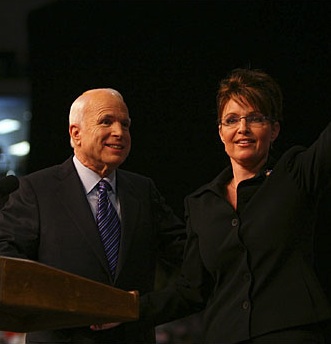 Since John McCain announced last week that his running mate would be Sarah Palin, the obscure first-term governor of Alaska, we have learned a few more interesting facts about her. None of them have made her look like a good choice.
Since John McCain announced last week that his running mate would be Sarah Palin, the obscure first-term governor of Alaska, we have learned a few more interesting facts about her. None of them have made her look like a good choice.
Palin is presented as a reformer of the corrupt political system in Alaska. There is some truth to this, but that may be overshadowed by her ties with recently indicted Alaska Senator Ted Stevens. Palin served as the director of the 527 group that raised money to support Stevens. McCain is on record as saying that 527s are disgraceful and illegal. Though in her debut speech Palin criticized the "bridge to nowhere" that Ted Stevens tried to have built in Alaska, she previously supported it. In this video, which the campaign would like to disappear, Ted Stevens (and his vest) endorses Palin during her 2006 gubernatorial campaign.
Palin is in favor of more domestic drilling and seems uninterested in reducing our dependence on oil. In fact, she said "I beg to disagree with any candidate who would say we can't drill our way out of our problem." Her husband works for an oil company and she has publicly supported drilling in the Arctic National Wildlife Refuge, which McCain has opposed. Palin's oil policy will not bring down prices, but it will enrich the oil companies. We have seen the results of electing champions for big oil to the highest offices in the government.
Palin is currently under investigation for allegedly putting pressure on the public safety commissioner to fire a state trooper who happened to be her sister's ex-husband. When the commissioner didn't comply, he was fired. This investigation will continue to unfold over these last two months of the campaign.
Palin supports the teaching of creationism in public school classrooms. Several court cases have shown that creationism is religion and not science and therefore has no place in our public schools.
I agree with Barack Obama when he says that the recently disclosed pregnancy of Palin's 17-year-old daughter should be off-limits to political attack. However, it serves as a poignant reminder that abstinence-only sex education, which Palin emphatically supports, does not work.
Palin was asked if she was offended by the words "under God" in our Pledge of Allegiance. Her answer shows a startling ignorance of history: "Not on your life. If it was good enough for the founding fathers, its good enough for me and I’ll fight in defense of our Pledge of Allegiance." The pledge wasn't written until 1892 and "under God" wasn't added until 1954, so all of the founding fathers were long dead before the pledge was written and could never have recited it.
Religious radicals like James Dobson may be thrilled with the selection of Sarah Palin for Vice President, but I think that her inexperience and her misguided opinions make her a terrible choice.
Hubbard on Xenu
 Scientologists avoid public discussion of some of the stranger elements of their mythology. L. Ron Hubbard, the founder of Scientology, was a science fiction author, so it's no surprise that he included some space aliens. South Park famously lampooned this mythology in the episode "Trapped in the Closet". An audio clip of Hubbard explaining the story of Xenu has been making the rounds on the Internet. Here's a copy of the clip on gawker.com.
Scientologists avoid public discussion of some of the stranger elements of their mythology. L. Ron Hubbard, the founder of Scientology, was a science fiction author, so it's no surprise that he included some space aliens. South Park famously lampooned this mythology in the episode "Trapped in the Closet". An audio clip of Hubbard explaining the story of Xenu has been making the rounds on the Internet. Here's a copy of the clip on gawker.com.
After listening to it, I think the South Park episode was pretty accurate.
People actually believe this.
Warren on atheists
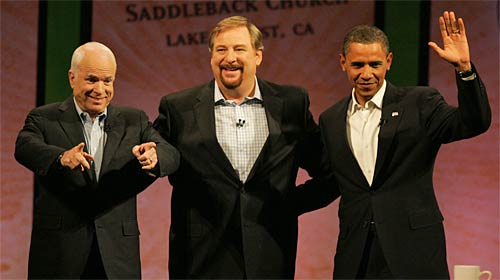
The day after interviewing Barack Obama and John McCain on the stage in his church, Rick Warren said this:
"I could not vote for an atheist because an atheist says, 'I don't need God,' " Warren said. "They're saying, 'I'm totally self-sufficient by [myself].' And nobody is self-sufficient to be president by themselves. It's too big a job."
LA Times
As for as I'm concerned, anyone is free to vote or not vote for someone based on any criteria. Our Constitution forbids any official religious test for office, but individuals can take religion under consideration if they think it's important. However, I have some problems with the way Warren justified his statement.
First, atheists don't say "I don't need God." We say that there is no such thing as God. We also don't say "I hate God," "I'm running from God," "I love to sin" or "I'm angry at religious people." I cannot hate or run from something that doesn't exist. The fact that Warren said this shows that he either doesn't understand atheism or refuses to take it seriously.
Second, he's right that the president needs help, but shouldn't that help come from knowledgeable human advisors? I think that a good president should listen to advice from trusted staff, trained experts, public opinion and even political rivals.
Third, how, exactly, does God help a person govern? Does he send intra-office memos? Does he call the president on a private line? Does he attend cabinet meetings? Does he speak to the president in dreams? How does it work? Wouldn't it be better if our president sought and took the advice of humans rather than trying to puzzle out the will of a silent God?
Fourth, for the last seven years we've had a president who claimed to be called and guided by God. I don't think that's going very well. In fact, I think that the delusion of God's favor has made President Bush especially arrogant and reckless. Because he thinks God is on his side, he is capable of ignoring good advice and going it alone. An atheist president would understand better than anyone that all we have is each other, and that we should take care of the earth, the only home we have.
Reason and belief
 The famous worst worship songs post now has more than 600 comments. The most recent comments have drifted off-topic into a discussion of the reasonableness of the belief in God in general. I'd like to move that discussion to this post, and I'm going to start things out by responding to Michael Mays.
The famous worst worship songs post now has more than 600 comments. The most recent comments have drifted off-topic into a discussion of the reasonableness of the belief in God in general. I'd like to move that discussion to this post, and I'm going to start things out by responding to Michael Mays.
Michael is a Christian recording artist and graduate of Southwestern Baptist Theological Seminary. You can listen to a sample of his music here. Here are the lyrics to the first song sample. I may be mishearing them, but I think I got the gist of it. If I'm wrong, maybe Michael can provide the real lyrics.
Guard me from rationalization
For the mind is the wicked one's tube of cream
To keep sin. It's just a vacation.
Lead me as a child through the fire and to your peace.
I know what you must be thinking. A lyrical genius such as this with a seminary education is certain to provide an elegant and robust argument in favor of the truth of Christianity. Believe it or not, I think I have uncovered some weaknesses in his argument.
It may be pointless to try to argue with a fundamentalist who is completely convinced that they know the truth and who refers to the human mind as a tool of Satan, but Michael's comment was such a study in the strange logic of Christian fundamentalism that I can't resist.
It's hard to know where to begin, so I'm just going to go paragraph by paragraph, skipping over any that don't contain something wrong. I don't expect to skip many.
Being an atheist makes people *happier*? Hmm...
Yes. Are you calling me a liar, Michael? There are several reasons that I'm happier, so please allow me to elaborate.
- There is no hell to fear.
- There is no all-powerful God refusing to prevent suffering.
- This life is the main event, not just the run-up to future life. That makes me value life more.
- I don't have to twist logic to make the world fit in with the Bible.
- Religious diversity/confusion makes perfect sense to me now.
- My morality is now more logical and consistent (and less arbitrary).
- I can embrace science.
- No longer have to accept anything based on the reason "because I said so."
- I don't have to view every friendship as a potential for evangelism.
- I have more free time.
I could go on, but those are some of the main reasons that I'm happier now.
The Bible is the Word of God. Try as you might, you'll never succeed in winning on the absurd argument of "only because YOU say so." If there is a God, he has the prerogative to write His own book under whatever methods He chooses, whether an atheist will accept it as such or not. (Thank God He has never left it to us to have to prove His own Word--it is, as He is, self-evident.)
When I read that paragraph, I was actually uncertain if this comment was a genuine Christian or a parody. (This uncertainty has a name: Poe's Law.) I'm not sure why Michael accuses me of asking anyone to accept an idea because I say so, but I do think it's hilarious that he writes that immediately after declaring that "the Bible is the Word of God." Michael makes no attempt at providing evidence for this assertion. "If there is a God..." that's a pretty big if. He proceeds to assume that there is a God in order to prove that the Bible is his word. I suppose that he would prove that God exists using the Bible. That's a circular argument if I've ever seen one. If Michael thinks that he has provided a way out of the circle by saying that God and the Bible are both self evident, then he is sadly mistaken. Neither of them are self-evident to me. But I guess I'm just blinded by my sin and pride, so I am unable to see what is so obvious to everyone else.
Okay, having established that FACT (no, of course atheists aren't happy about that FACT, that's their PROBLEM, no matter what is said--see the above quote), let's consider what the Bible says, very succinctly:
Michael must define the words "established" and "fact" very differently than I do. The rest of this paragraph suggests that he knows that he has not made a convincing argument, but he forges on and begins quoting the Bible as if he can make me accept it as an authority by sheer force of will.
I honestly do not understand why Christians even bother quoting the Bible to atheists. Until you have established it as something more than a collection of human philosophies and tall tales, it's completely pointless to quote the Bible to me. When I was a pastor, I taught classes about evangelism and I stressed the fact that quoting the Bible is only useful when the person accepts it as true. I taught that the Christian must do what Francis Schaeffer called pre-evangelism. Apparently, this is a lesson that many in the church have not learned.
The other issue you've raised (the more interesting but still elementary one) is that "adherents to every religion can tell stories like yours about how their beliefs made their life better." You are confusing religion and faith; they are not the same. Religion is a system of beliefs; faith is a relationship with a very real, very holy God. If anyone is looking for hope in a religion, they might as well be atheists, because God will view them as the same in the end (Matt. 7:21-23).
Many Christians have a serious aversion to the word "religion". I did, too. But, as far as I can tell, what Michael describes fits in just fine with this definition:
re·li·gion (rĭ-lĭj'ən) n. 1. Belief in and reverence for a supernatural power or powers regarded as creator and governor of the universe. 2. A personal or institutionalized system grounded in such belief and worship.
Semantics aside, Michael does not address the point that I made. Many religions use the same "evidence" that he puts forward. Muslims say that Islam is a personal relationship with a real God who obviously exists and dictated the Quran to Mohamed. Mormons say that the truth of their book is self-evident. Scientologists claim that their lives are improved by the teachings of their church. All the religions that make claims like this provide the exact same evidence that Michael provides, which is none at all.
Call it circular logic, but since God is the author of logic, He alone gets to be the one who says "because I said so."
Yes, it is circular logic. If you are going to claim that your religion (I'm sorry, your faith) allows you to break the laws of logic, then your beliefs are illogical by your own admission.
Yes, I've been using a lot of Scripture. Atheists usually write this off as a sign of inability to make valid arguments, and on any other area of discussion they would be right.
I'm still not sure that this isn't a parody. I'm going to go ahead and write off your use of Scripture as an inability to make valid arguments, just as you expected.
But I'm citing evidences here, not lofting programmed, knee-jerk responses without thought of what they really mean. It will still look that way because the devil is very good at his job: "The god of this age [Satan] has blinded the minds of unbelievers, so that they cannot see the light of the gospel of the glory of Christ, who is the image of God. For we do not preach ourselves, but Jesus Christ as Lord..." (2 Cor. 4:4-5)
You're asking me to accept the Bible as evidence, which is assuming what you are trying to prove. Would you buy this argument from a Mormon? I've been told by Mormons that if I will simply believe that the Book of Mormon is true, then when I read it I will see that their church is correct. Michael, would you accept that as a convincing argument if two Mormon missionaries were standing at your door?
Let me see if I get this straight. If I will simply ignore some of the laws of logic, I will see that God is real. But I've been blinded by the devil, who is making me think that your admittedly illogical statements are illogical. Am I understanding this correctly?
And to prove that I have no right to claim any authority (and, hence, responsibility) for this evidence on the merits of my own knowledge or intellect . . .
Michael, you don't have to prove that. Of all the things you're saying, that's the one that I will accept.
Atheists can argue with these facts all they want--they might even think they've won. But when they stand before God to give account for their lives, I somehow doubt they'll find much to say.
Here's an interesting strategy. Michael is trying to make me afraid that a god I don't believe in is going to send me to a hell that doesn't exist in an afterlife that will never happen. Not only do I find this unconvincing, but I am going to call it what it is: terrorism. The doctrine of hell is a way to scare people into believing and doing certain things. That is the very definition of terrorism, and it won't work on me.
So, I remain unconvinced that any of thousands of religions are more than human inventions. I hope Michael will come back and continue discussing reasons for and against belief in God. Everyone else is welcomed to join in the conversation, too.
King Josiah's Book
When I walked away from Christianity one year ago, I didn't have all the answers. I continued to read and think and to remain open to evidence that I hadn't seen yet. I first looked at the New Testament and I tried to understand how it came to be and what it is if it's not the word of God. Recently, I've turned my attention to the Old Testament. I'm still not certain of any of this, but I think it's a plausible explanation for how the Old Testament was written and how the Jewish religion began.
 I'm reading the Bible Unearthed by Neil Asher Silberman and Israel Finkelstein and they say that many parts of the first half of the Old Testament appear to have been written in the seventh century BCE. They base this on geography, writing style, archaeological finds and themes. I won't present his evidence here, but I think the book makes a convincing case. I would like to look at a few passages from the Bible itself and see if they fit in with this theory.
I'm reading the Bible Unearthed by Neil Asher Silberman and Israel Finkelstein and they say that many parts of the first half of the Old Testament appear to have been written in the seventh century BCE. They base this on geography, writing style, archaeological finds and themes. I won't present his evidence here, but I think the book makes a convincing case. I would like to look at a few passages from the Bible itself and see if they fit in with this theory.
Let's begin in the seventh century BCE. The kingdom of Israel in the north has been conquered by a Assyria a few hundred years before. The king in Judah in the south is named Josiah. His small kingdom is beset by enemies on all sides. He's trying to bring together Judah and the parts of Israel that are not under tight Assyrian control. He is urgently trying to form a national identity for his people so that he can protect them and himself from his enemies (including Egypt, Moab, Ammon and Assyria). The religious climate at the beginning of Josiah's reign is thoroughly polytheistic. A cult of Yahweh exists, but only as one of many gods that the Judahites worshiped.
Most students of the Bible would agree with everything in that last paragraph. They would add that Judah had not always been polytheistic and there was a time when they worshiped only Yahweh and kept his festivals. But in reality, there's no good evidence for that. It is possible, and I think likely, that Judah had always been polytheistic. With that in mind, read 2 Chronicles 34. Ignore for the moment the fact that Josiah is destroying these religious practices, and try to read this as a description of the religion in Judah in the seventh century.
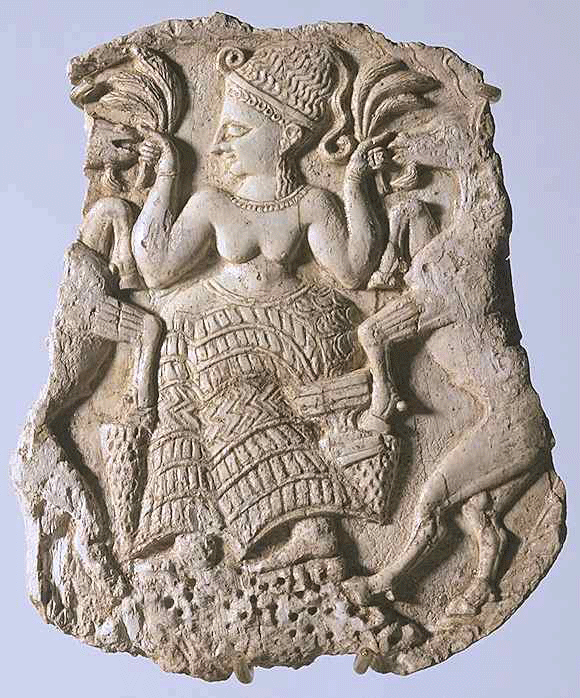 Judahites worshiped Asherah (wife of El), Baal, Molech (including human sacrifices), Ashtoreth and Chemosh. They also had mediums, spiritists and household gods. There were altars to these gods and Yahweh scattered around the region. What if this is not describing a temporary falling away, as the Bible claims, but as the normal state of things in Judah up to this point? What if Judah had always practiced polytheism just like the surrounding nations? If that was the case, then what happens next takes on a whole new meaning.
Judahites worshiped Asherah (wife of El), Baal, Molech (including human sacrifices), Ashtoreth and Chemosh. They also had mediums, spiritists and household gods. There were altars to these gods and Yahweh scattered around the region. What if this is not describing a temporary falling away, as the Bible claims, but as the normal state of things in Judah up to this point? What if Judah had always practiced polytheism just like the surrounding nations? If that was the case, then what happens next takes on a whole new meaning.
In 2 Kings 22 and in 2 Chronicles 34, a story is related of a priest renovating the Temple in Jerusalem and finding a book. The priest's name is Hilkiah, and he delivers the book to Josiah. Hilkiah and the King's men pay a visit to a prophetess named Huldah. Huldah confirms that the book is the ancient book of the Law of Yahweh and she delivers a prophecy in which Yahweh threatens to destroy Judah if they don't follow this book and cease the worship of all other gods.
The Bible contains two accounts of this story and they are very similar except for the order of events. In 2 Kings 22-23, the book is found first and the reformation is a result of that. In 2 Chronicles 34-35, Josiah begins the reformation toward monotheism and then he conveniently "finds" a lost book describing this religion. Then he produces an ominous prophecy to help convince the people to adopt the new national religion.
The order of events seems to make a big difference. I think that Josiah began the transition to monotheism for political reasons. By elevating Yahweh from the head of a pantheon to the one and only true God, he was able to consolidate religious power in his capital, Jerusalem, which was the one true location where Yahweh could be worshiped according to the new book. The book that his priests found, compiled or composed described a religion which tolerated no rival. If this book, as I suspect, also included at least parts of Genesis and Joshua, then it provided a historical reason for Judah and the remnant of Israel to unite and to fight their enemies with confidence and total devotion. It's not hard to see how "finding" a book like this would be a big help to Josiah.
With this theory in mind, I have revisited several familiar stories from the Old Testament and many of the stories fit in very well with the aims of King Josiah. For example, Ammon and Moab, two nations that Judah had often battled, are given an embarrassing origin myth in Genesis. After Abraham's nephew Lot narrowly escapes the destruction of Sodom, his daughters get him drunk enough to sleep with them. The sons born from these incestuous unions are the founders of the Ammonites and Moabites. Even if Genesis was a counterfeit used to consolidate power, you can't say that its authors didn't have a sense of humor.
But for Josiah's kingdom, the most relevant origin myth was the story of Jacob and his sons. In order to convince the various tribes around him but they were all really one nation with one God and one history, Josiah's book includes a story of a man with 12 sons. Each son has the same name as one of the tribes. And wouldn't you know, when that man dies in the story he tells his sons that Judah's descendants will rule over them. Josiah is from the tribe of Judah.
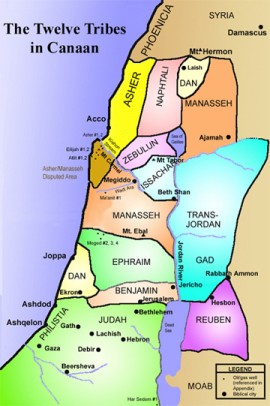 In the story of Joseph being sold into slavery by his brothers, three of the brothers are portrayed positively. They are Joseph, Benjamin and Reuben. Look at this map showing the territories of the tribes and see if you can guess why Josiah might have wanted to make these three brothers the heroes. (Joseph was the father of two tribes named after his sons Ephraim and Manasseh.)
In the story of Joseph being sold into slavery by his brothers, three of the brothers are portrayed positively. They are Joseph, Benjamin and Reuben. Look at this map showing the territories of the tribes and see if you can guess why Josiah might have wanted to make these three brothers the heroes. (Joseph was the father of two tribes named after his sons Ephraim and Manasseh.)
The tribes that descended from the heroes of the story are all clumped together on the map in the territories that Josiah would need to acquire first. Once again, the story seems to serve the political needs of King Josiah.
The story of the Exodus would have been useful to Josiah. Egypt was one of the most dangerous enemies of 7th century Judah. A scattered people needed to be convinced that they could defeat this empire. The story of the Exodus is an effort to do just that. It also provided a good backstory for the Yahwist festival known as Passover, which Josiah reinstituted.
The book even included a prophecy that predicted that a great and holy king will be born in Judah named . . . wait for it . . . Josiah! (1 Kings 13:2)
If the accounts in 2 Kings and 2 Chronicles are correct, then Josiah went to great lengths to execute his plan. He rounded up the leaders of the newly banned cults, slaughtered them, then desecrated their altars. His clever stories and prophesies apparently didn't convince everyone, so some murder and terrorism let the people know that they should go along with this new religion or else.
Unfortunately for Josiah, his plan didn't work the way he expected. He was killed in a battle against Egypt and his religious reforms were quickly reversed. A few decades after his death, Josiah's version of Yahweh worship took on new meaning when Judah was conquered by Assyria then Babylonia. The Jewish religious leaders who were exiled or returning from exile may have rediscovered the book that Josiah's priests compiled. In their time the need for national identity was just as great, and they may have preserved and expanded the work of Josiah.
I'm not saying I'm certain that this is how it happened. This could just be a fanciful attempt to make the Bible fit into my worldview. But, as science and archaeology continue to point out inaccuracies in the Bible, explanations like this one become much more plausible.
With that disclaimer, I'll venture a little further into crackpot theory territory. Scholars usually think that the book of the law in the story was actually Deuteronomy. Other scholars, including Finkelstein, think that Deuteronomy - 2 Kings is all in the same style. My suspicion is that Josiah went to the temple of Yahweh, the top deity in the pantheon, and consulted with a priest, probably Hilkiah, about making the cult of Yahweh the only game in town. I doubt that one man could produce Genesis - 2 Kings, so Hilkiah probably worked with other priests to adapt existing stories and legends (see the documentary hypothesis) and craft new ones to serve the needs of the cult and the king. If Hilkiah was a literary genius, then it may have run in his family. The prophet Jeremiah, himself the author of two books of the Bible, had a father named Hilkiah and was supposed to have been alive during the reign of Josiah (Jeremiah 1:1, Jeremiah 35:25). Josiah, Hilkiah, Jeremiah, the other priests of Yahweh and the prophetess Huldah may have all worked together in a patriotic effort to bring their nation together and help it survive. Their work wasn't all original, but their retelling of the legends served to form a national identity that endured for centuries and provided a backdrop for several spin-off religions.
A real campaign sign
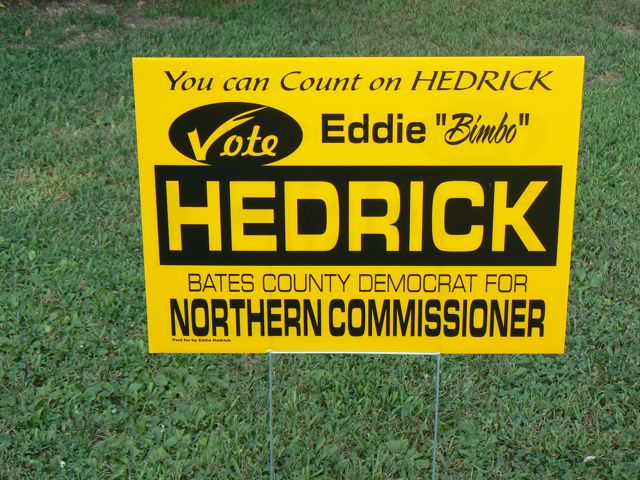
This is the sign from a real campaign for Northern Commissioner of Bates County, MO. Notice anything strange about it?

Recent comments